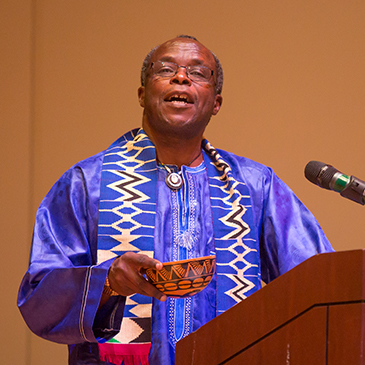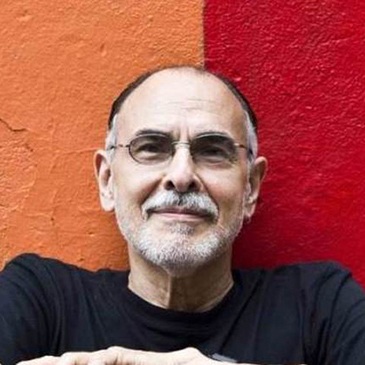Assembled from every corner of the world with many areas of expertise, faculty members at the University of Miami are passionate scholars who conduct extraordinary research, expand knowledge, and discover new areas of innovation both in our back yard and overseas. For some, the opportunity to explore or teach abroad on a prestigious Fulbright scholarship could be defined as the pinnacle of success.
Established in 1946 under legislation introduced by then-U.S. Senator J. William Fulbright, of Arkansas, the Fulbright Scholar Program seeks to increase mutual understanding between the people of the U.S. and other countries by providing students, scholars, and professionals the opportunity to study, conduct research, and teach around the world.
Named for the late senator, whose daughter, Roberta “Bosey” Fulbright Foote was married to UM’s fourth president, Tad Foote, the program is particularly meaningful to Edmund Abaka and George Yudice, professors in the College of Arts and Sciences, who were selected in 2016 as Fulbright scholars to pursue their topics of interest. Abaka is teaching in Ghana while researching the Hausa Diaspora, and Yudice was invited to teach a course on the impact of new media on public policy in Brazil.
Below are stories profiling their work:
Edmund Abaka
 Edmund Abaka, professor of history, was eager to begin his adventure at the University of Cape Coast in Ghana at the start of the 2016-17 academic year. As a recipient of a Fulbright Foundation Core Research Award for Ghana, he has spent two years teaching and conducting research at the African university on the Hausa, the largest ethnic group in West Africa.Typically, the timespan of a Fulbright Core award is anywhere from two to 12 months, but Abaka was fortunate enough to receive an extension to further investigate the Hausa’s dispersal to, and influence, in Ghana.
Edmund Abaka, professor of history, was eager to begin his adventure at the University of Cape Coast in Ghana at the start of the 2016-17 academic year. As a recipient of a Fulbright Foundation Core Research Award for Ghana, he has spent two years teaching and conducting research at the African university on the Hausa, the largest ethnic group in West Africa.Typically, the timespan of a Fulbright Core award is anywhere from two to 12 months, but Abaka was fortunate enough to receive an extension to further investigate the Hausa’s dispersal to, and influence, in Ghana.
“I could not canvass the extensive research field necessary to complete the project on the Hausa Diaspora in Ghana: Migration, Identity and Citizenship,” said Abaka. “Sixty percent of my time was dedicated to teaching and forty percent to research.”
The Hausa first began to settle in Ghana nearly 500 years ago, with a significant increase noticed after the expansion of trade in the 18th century and the “holy wars” of Fulani (in West Africa) in the 19th century.
The trading diaspora in Africa, where merchant settlements were formed in certain countries based upon where they sold their products for international trade, have been equated with the voluntary migration of the Hausa people. Abaka believes, however, that voluntary migration was only a small part of the story. “Ethnic groups such as the Hausa were involved in both voluntary and forced migration to modern Ghana. In all cases, these diasporic communities—the Yarse, Dyula, Fulani, and Hausa—kept ties with their homelands through extensive networks,” he said.
Abaka’s extended time in Ghana allowed him to travel to several parts of the country and collect data related to the Hausa migration. “The extra year has helped me to excavate material from libraries and archives in various parts of the country and to conduct more interviews,” he said.
Abaka continues to share his findings and learn from other researchers in Ghana. “Last year, I presented on a segment of the project at the University of Education, Winneba, and got some good feedback,” he said. “I am scheduled to give a presentation at the University of Cape Coast at the tail end of this semester, and I think the extra time to collect more material and test out some ideas have made a difference for me.”
Abaka will also use the data to write various articles on the subject, one of which he is currently wrapping up.
“I am grateful to the University of Miami for making it possible for me to undertake the second- year trip,” Abaka said. “I am now eagerly looking forward to my time back at the U.”
 George Yudice
George Yudice
A three-time Fulbright award recipient, George Yudice, professor of Latin American studies, is no stranger to the sharing of knowledge across countries and cultures. His most recent grant took him to the Pontifical Catholic University of Rio de Janeiro, Brazil, where he co-instructed a mini-course that examined how the rise of social media, streaming platforms, and smart technology have affected public policies.
“The rise of new media has impacted everything,” said Yudice. “It has made it more difficult for anyone in music to make money by selling records. It has created new fields of study, including digital humanities. And it has left higher education wondering if it can resist the offering of online courses.”
Yudice notes new media companies wield unprecedented power. “Entities like Google and Facebook have the power, in some cases, to be stronger than more than half of the governments in the world,” he said. “Often what you see is the CEOs of these companies negotiating with presidents of other countries as if they themselves were presidents.”
An issue gaining popularity is the question of access and regulation. Access to the internet and free communication platforms, such as Facebook and Whatsapp, have drastically changed the way younger generations interact with one another. It has also left many governments questioning whether these platforms should be considered essential public utilities, and regulated as such.
“Latin American governments are ill-prepared, both legally and financially, to support domestic equivalents, which would contribute to tax revenues,” said Yudice. “At the same time, the question arises as to who should provide a seemingly public service, such as the internet, which is nowadays the equivalent of classic utilities of the 20th century, such as water and power.”
Yudice continues to follow the trends and study the impact of new media on our world. “Activist movements like Occupy and the Arab Spring gained support through the use of the Internet and social media,” he said. “The use of this media also led to a major transformation in 2004 in which the Basque separatists in Spain were falsely blamed for the train bombings that took place three days before the general elections resulting in a social media movement that caused the defeat of incumbent Jose Maria Aznar. It even affected our own U.S. presidential elections in 2016.”
Yudice’s work in Brazil is certain to pose questions regarding how world leaders should or could adjust their governance with technology in mind. As he examines and discusses new media’s influence on policies that impact our daily lives, he is hopeful that his research will support positive change around the world.
____________________________________
Read about other notable Fulbright scholars at UM.
